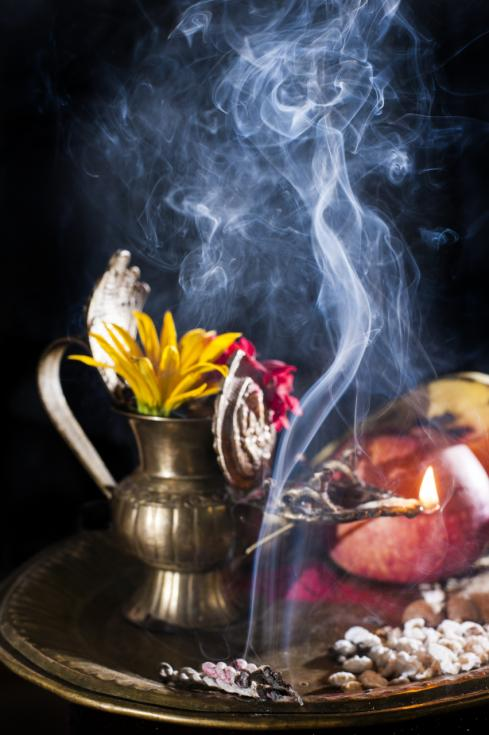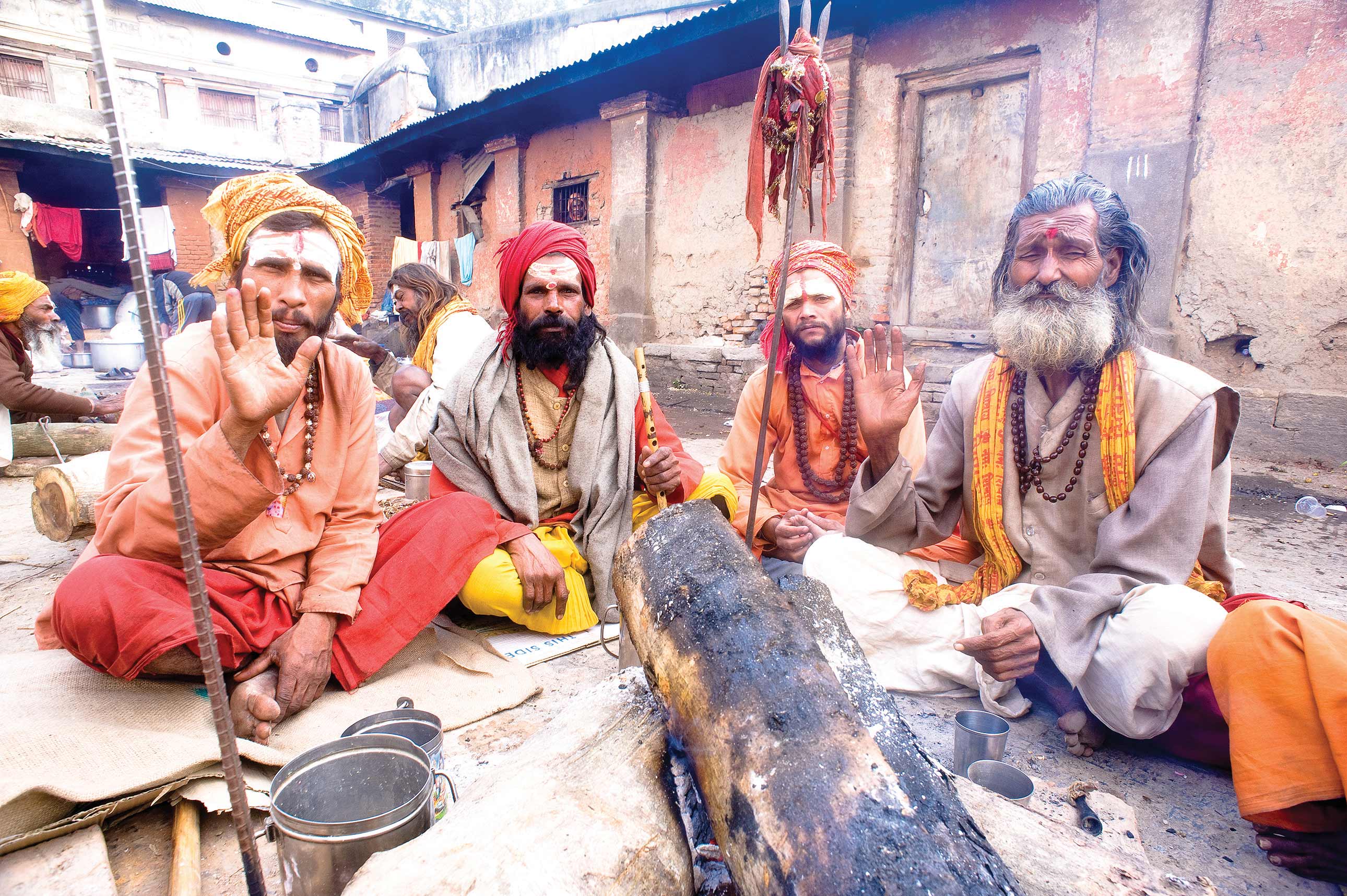April 2015's historic earthquake, experienced far from home, amongst the Annapurna mountains.

Oh, you heard the whole commotion last night?” asked my guide. “I did try to drown out all the noise and go back to sleep, but it was really hard to,” I replied. To tell the truth, it was so entertaining that I’m glad I was awake; I would have been so disappointed if I hadn’t heard it all.
Our group of six, including our guide and porter, were heading towards Ghandruk, a picturesque village in the foothills of the Annapurna range, and one of the biggest settlements of the Gurung community in Nepal. The day earlier, April 24, 2015, my group had decided to stay for a whole day at Jhinu, a small village en-route to Annapurna Base Camp (ABC), which has natural hot springs. The idea of spending a day at the hot springs was what everybody was looking forward to after hiking for seven hours every day for four days continuously.
When this conversation was taking place, my group was on the way down, midway between Jhinu and the paths that headed in two directions—Kinu and Ghandruk. Our guide wanted us to increase our pace so that we made it in time for lunch at Ghandruk. We were late. Half my group had woken up really late in the morning due to some eventful revelry the night before, which carried on to the wee hours in the morning. With all the commotion that followed after the cultural night, consisting of some excited sparring of words through dohori (folk songs), I hadn’t been able to sleep that well.
ABC was not my first choice for trekking. It was actually my third, Manaslu being the first, followed by Kanchenjunga. Manaslu, I was informed, was a difficult route, with a lot of uphill and downhill roads, and my legs, which had been hiking for only three months every Saturday, was just not ready for all that strain. Kanchenjunga was still a fairly new trekking route, with relatively less infrastructure. The idea of having to camp out didn’t appeal to my group. So, three weeks before our planned trek, we zeroed in on ABC.
The trek didn’t start off on a good note. The first day resulted in an unplanned night stay at Pokhara because of the bad traffic at Mugling. Dhampus was initially our first trekking stop, but an extra day at Pokhara meant one more added day to the itinerary, which we couldn’t afford. Instead, we headed to Nayapul, and then started hiking to Landruk. A sluggish start, followed by a few incidents—one of my team members misplacing his jacket at one point of the trail, and me realizing I hadn’t brought my sun glares (thank god for the Chommorong Wholesale Shop), and a slightly unnerving experience on the way to the Base Camp, when I slipped on ice and fell into a seven-feet hole, my guide and porter frantically trying to pull me out. If it hadn’t been for the soft snow, my guide informed me, I would probably have had a serious injury.
Rain, and later, snow, followed us all the way to the Base Camp. My hands were freezing, and I could barely hold my walking stick. The rain and snow that kept hitting my face didn’t help either. Pretty much, everybody cursed the whole way, “I swear off snowfall as being romantic,” were the only words one of my group members said throughout the way. With every heavy freezingly cold step we took, our chances of seeing the mountains seemed dimmer and dimmer by the minute. But, when we reached the top, the skies cleared up. That night, I witnessed one of the most spectacular night skies that I had ever seen in my life, and the morning sky was even better.

At the hotel at Jhinu, we met some of the trekking groups that we had come across along the way. The group that consisted of a Japanese guy and two Korean girls, I remembered how they had been so seriously engrossed in their card games at ABC, while my group tried to warm their hands on the paraffin burner under the table. The girls also thought—as my guide, who was in a very chatty mood, informed me on the way back to Chommorong—that he was very good looking. I ended up walking the whole way down listening to him brushing up on his Korean language skills with his app. The French group of fifteen to twenty, including their guides, was also there. We had met them a couple of times along the route; all were in their late sixties or seventies. The oldest was an octogenarian who was 85 years old.
“Drink up! It’s only clear water,” (referring to the local brew made of millet) was heard throughout the hall, and with more than thirty excited trekkers on their way back home, dinner became one big party with drinks and dohori. Almost everybody was dragged on to the floor by one of the members of the French group. Dohori gave way to some seriously fast spin moves, highly energetic dance moves on the floor and on the table, and a serious session of dohori that didn’t seem likely to end for a long time. Our normally quiet guide, too, joined the singing with his own improvised lyrics, with a mix of Korean, to the utter delight of his two Korean friends. Nobody was ready to call it a night, including the lodge owners, the husband busy refilling everybody’s glasses, and his wife taking up the challenge to sing dohori songs with the trekking groups.
While I was drifting in an out of sleep, I caught snatches of conversation taking place outside my room. “Where are you? I can’t hear you? You mean you’re at the hot spring?” and what felt like hours later, the lady owner of the house screaming at one of the team members of the French group, “Somebody clean him up, you can’t take him to his room like that!”.
In the morning, I heard the complete story. The head guide had apparently headed out to the hot spring for a night time dip. Along the way he had tripped and hurt his forehead, and managed to land in a cesspit of cow dung, which he mistakenly thought was the hot spring!
As my group kept making fun at the poor man’s expense, we reached the bend where we would have to walk in a file. The slope was pretty steep, and it looked recently flooded. I tried not to look down, but a small nagging voice kept scaring me, “What if I slip down this slope? I’m a goner, for sure.”
I was the slowest member in my group. The others had already crossed that turning point and were waiting for me to reach the clearing. The first thing I did was sit on the rock and watch people working in the field. Three minutes later, the ground moved. It was a really loud noise, like the avalanches at Annapurna, and I could hear rocks and boulders breaking apart and raining down. I stood frozen in my spot, and the two women in the field came running towards me, screaming, “Earthquake!” Right across the field, I could see the place where I had stood hours earlier; a trekker in white was transfixed to the spot. Huge rocks were rolling down, and it made for a really terrifying sight. I slowly headed back towards the lane I had only just crossed, and saw that it had been washed out.

An American trekker had been right behind me. He came racing to the field and just sat dazed on the ground. “I don’t know what happened. It was my instinct…I crouched on the ground covering my head…this huge rock, ten-feet-long, flew over my head, missing me by inches.” Next, a Chinese guy slowly approached our group. He was extremely shaken up and could barely speak. Even at that point, I still not realized the gravity of the situation.
It was only when our porter got a call from his sister in Barpak, Gorkha, that the magnitude of the destruction began to sink in. “My sister just said that they are alive, but the whole village is gone, totally flattened out,” he stated in a matter of fact voice. My guide’s house, which was also in Gorkha, had suffered a similar fate. The next thirty minutes were spent on making frantic phone calls back home. I managed to call my brother, who was at a futsal match. He assured me that he was okay and would call me once he got hold of my mum, who was at home with our dog.
All we could do was head towards Ghandruk. The Chinese guy decided to tag along with us, instead of heading to Kinu like he had planned. As we neared the village, we saw groups of villagers sitting on the edge of the hill listening to the radio on their cell phones. At every corner where there was network connection, I kept getting frantic calls from my friends living abroad. We trudged along the path uphill, occasionally coming across houses with cracks, and some with broken roofs. One man we met on the way was heading towards Landruk, “My daughter’s husband has died. Her house has collapsed too. Mine has a few cracks.”
We finally reached a lodge up on the hill that had an open field. We still hadn’t seen the visuals of the destruction caused by the earthquake. “The Dharahara is gone, and temples in Patan and Kathmandu. I saw it on Facebook,” an elderly grandmother informed us.
I finally got the long-awaited call from my brother, my mum was okay, and so was our dog. While we checked our FB feed, mostly on my cell, since I was the only one who had network, it was very frustrating. Not being able to help since you’re far away from home is frustrating, but at the same time, a small part of me was relieved that I was far away and comparatively safe. I am not really good at dealing with a highly stressful environment. Away from it all, where I had electricity and the Net, I could at least talk to my friends living abroad, and work with them to help plan relief efforts, which would be vital now.
As for our Chinese friend, I downloaded WeChat, and after dinner translated our conversation about our travel plans the next day. He then set up his camera on the table, sat on his chair with a cup of tea, and lied back to soak in some beautiful nighttime scenery of the mountains. Despite the fact that we were all on the ground floor, fearing aftershocks, he was the only one who looked like he was enjoying and living that moment, taking countless pictures of the moon, and occasionally showing the views to his friends on WeChat!
When people ask me what was that one moment that I will always remember about the earthquake, it’s this moment. Strange as it may sound to others, but that particular moment struck a chord. It was at that precise moment I realized that I had never ever before appreciated or been really thankful for being alive.









